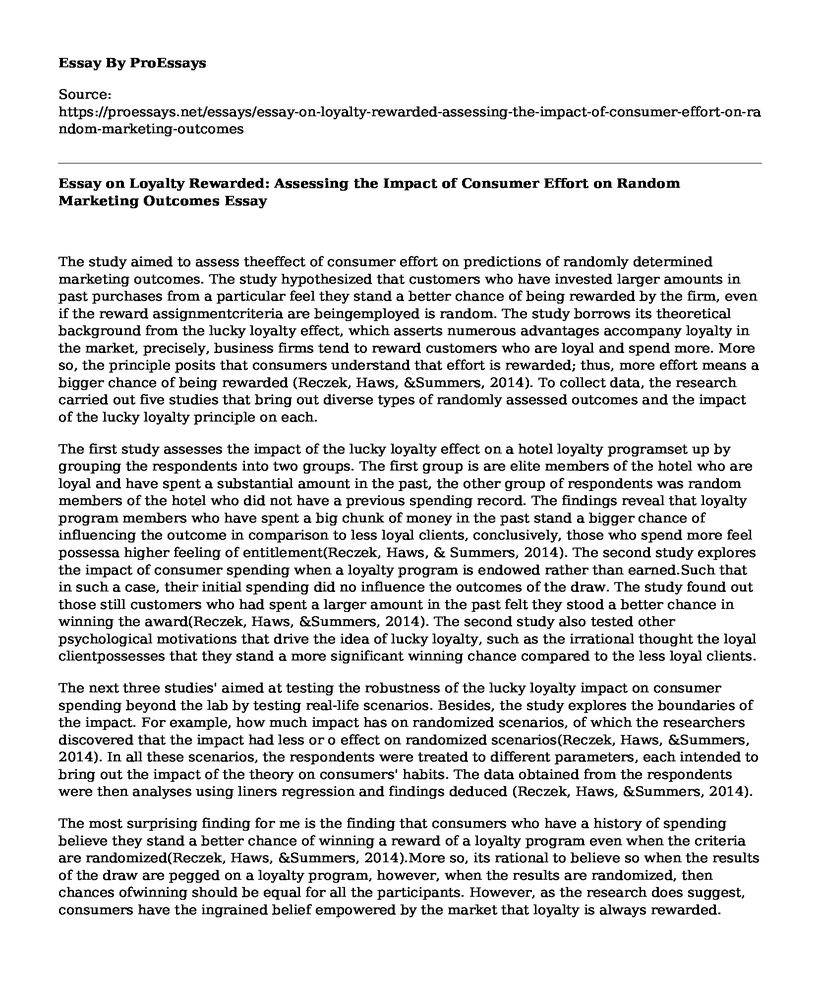The study aimed to assess theeffect of consumer effort on predictions of randomly determined marketing outcomes. The study hypothesized that customers who have invested larger amounts in past purchases from a particular feel they stand a better chance of being rewarded by the firm, even if the reward assignmentcriteria are beingemployed is random. The study borrows its theoretical background from the lucky loyalty effect, which asserts numerous advantages accompany loyalty in the market, precisely, business firms tend to reward customers who are loyal and spend more. More so, the principle posits that consumers understand that effort is rewarded; thus, more effort means a bigger chance of being rewarded (Reczek, Haws, &Summers, 2014). To collect data, the research carried out five studies that bring out diverse types of randomly assessed outcomes and the impact of the lucky loyalty principle on each.
The first study assesses the impact of the lucky loyalty effect on a hotel loyalty programset up by grouping the respondents into two groups. The first group is are elite members of the hotel who are loyal and have spent a substantial amount in the past, the other group of respondents was random members of the hotel who did not have a previous spending record. The findings reveal that loyalty program members who have spent a big chunk of money in the past stand a bigger chance of influencing the outcome in comparison to less loyal clients, conclusively, those who spend more feel possessa higher feeling of entitlement(Reczek, Haws, & Summers, 2014). The second study explores the impact of consumer spending when a loyalty program is endowed rather than earned.Such that in such a case, their initial spending did no influence the outcomes of the draw. The study found out those still customers who had spent a larger amount in the past felt they stood a better chance in winning the award(Reczek, Haws, &Summers, 2014). The second study also tested other psychological motivations that drive the idea of lucky loyalty, such as the irrational thought the loyal clientpossesses that they stand a more significant winning chance compared to the less loyal clients.
The next three studies' aimed at testing the robustness of the lucky loyalty impact on consumer spending beyond the lab by testing real-life scenarios. Besides, the study explores the boundaries of the impact. For example, how much impact has on randomized scenarios, of which the researchers discovered that the impact had less or o effect on randomized scenarios(Reczek, Haws, &Summers, 2014). In all these scenarios, the respondents were treated to different parameters, each intended to bring out the impact of the theory on consumers' habits. The data obtained from the respondents were then analyses using liners regression and findings deduced (Reczek, Haws, &Summers, 2014).
The most surprising finding for me is the finding that consumers who have a history of spending believe they stand a better chance of winning a reward of a loyalty program even when the criteria are randomized(Reczek, Haws, &Summers, 2014).More so, its rational to believe so when the results of the draw are pegged on a loyalty program, however, when the results are randomized, then chances ofwinning should be equal for all the participants. However, as the research does suggest, consumers have the ingrained belief empowered by the market that loyalty is always rewarded.
An aspect I did not like about the study is the fact that the study chooses to use a significant sample population. The study opted to study five scenarios in different audiences; this then dictated that each study be carried out on different population set and analyzed separately. The five independent scenarios make the research sound like five different pieces of research thus lucking the narrowness and precision that researches ought to have.
The first relevance of the program is that it brings out the lucky loyalty impact using imperial data proving that customers believe that more considerableeffort, i.e., spending more on the market, makes one stand a higher chance of winning promotion from a loyalty program. This is essential data since this shows a business that for more significant and more recurrent purchases in the future, a business ought to rewards its customers for the effort they have made in purchasing with them. Moreover, they study rouse relevant questions that further research should be done to find out, and this includes questions like to what exact level does the lucky loyalty principle influence spending, and what are the deterrent factors. More so, the data will help businesses in designing loyalty programs in such a way that it genuinely rewards loyal clients. Conclusively, the research is both essential in providing research literature for scholars and also providing essential practical information and recommendations to businesses.
References
Reczek, R. W., Haws, K. L., &Summers, C. A. (2014). Lucky loyalty: the effect of consumer effort on predictions of randomly determined marketing outcomes. Journal of Consumer Research, 41(4), 1065-1077.
Cite this page
Essay on Loyalty Rewarded: Assessing the Impact of Consumer Effort on Random Marketing Outcomes. (2023, Jul 18). Retrieved from https://proessays.net/essays/essay-on-loyalty-rewarded-assessing-the-impact-of-consumer-effort-on-random-marketing-outcomes
If you are the original author of this essay and no longer wish to have it published on the ProEssays website, please click below to request its removal:
- Perfect Competition Market and Monopoly Essay
- Labor Disputes on Jet Airways
- Essay Sample on Strategic Market Analysis
- Essay Sample on Strategic Planning
- Essay Sample on Organizations: Review Compensations & Offer Raises to Attract/Retain Best Workers
- Essay on Illy Coffee: Roasting Coffee Since 1933, World-Renowned Italian Brand
- Paper Sample on Rite Aid Corporation: Market Leader with Sustainable Advantage







